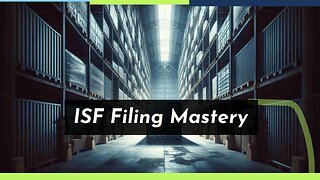Premium Only Content

Mastering Importer Security Filing: The Key to Accurate Tariff Classification
ISF Depot // 661-246-8217 // [email protected] // www.isfdepot.com
Importer Security Filing (ISF) is a requirement by the US Customs and Border Protection (CBP) for ocean shipments entering the United States. It mandates that importers or their agents submit specific information about their shipments in advance. Tariff classification, on the other hand, is the process of assigning a specific code to a product based on its description and characteristics. These codes, known as Harmonized System (HS) codes, are used globally to identify and categorize goods for customs and statistical purposes.
The link between Importer Security Filing and tariff classification lies in the need for accurate and timely information. ISF requires importers to provide a detailed description of the imported goods, including their HS codes. This information is crucial for proper tariff classification. Customs brokers play a crucial role in ensuring the accuracy of tariff classification within the ISF process. They work closely with importers to gather all the necessary information and ensure that the products are correctly classified.
Compliance with ISF requirements requires importers or their agents to submit the ISF filing at least 24 hours before the cargo is loaded onto the vessel bound for the United States. The filing should include details such as shipper name, seller name, HS codes, estimated arrival date, and more. By providing this information in advance, CBP can assess the security risks associated with each shipment.
The impact of ISF on tariff classification is significant. Accurate tariff classification is essential for determining the correct duty rates and ensuring compliance with trade agreements and regulations. The information provided in the ISF helps customs officials verify the accuracy of the imported goods and assess whether they match the declared HS codes.
It is essential for importers to understand the consequences of incorrect tariff classification, which can result in substantial penalties. Submitting a complete and accurate ISF can minimize the risk of misclassification and potential penalties. Working with experienced customs brokers who are well-versed in tariff classification can help importers navigate this complex process more effectively.
In addition to ISF, importers are required to have a customs bond in place. A customs bond is a financial guarantee that ensures importers will fulfill their obligations, such as paying duties and taxes, in a timely manner. It provides a safety net to both the importer and the CBP, minimizing the financial risk associated with importing goods. The bond amount is typically based on either the total value or total duties paid on the imported goods within a given year.
In conclusion, ISF and tariff classification are interconnected. ISF provides crucial information that facilitates accurate tariff classification, ensuring compliance with customs regulations and avoiding penalties. Customs brokers play a vital role in assisting importers with both aspects, guiding them through the ISF process and ensuring proper tariff classification. Importers should prioritize accurate classification and timely filing to avoid any compliance issues.
#usimportbond #isfcustomsbroker #uscustomsclearing #isfentry
Video Disclaimer Here: This tutorial is independent and not affiliated with any US governmental entities.
-
 4:50
4:50
ISF Depot
7 days agoUnlocking Success: The Power of Accurate Tariff Codes in ISF Filing
31 -
 LIVE
LIVE
StuffCentral
3 hours agoBad Company Presents: Ball in the fall, Two 1v1 cash prize tournaments back to back!
98 watching -
 LIVE
LIVE
Midnight In The Mountains™
2 hours agoGaming w/ Gaming w/ PER·SE·VER·ANCE | Family Event OVER EARLY! | Midnights Split Stream!
19 watching -
 LIVE
LIVE
Mally_Mouse
6 days ago🌶️ 🥵Spicy BITE Saturday!! 🥵🌶️- Let's Play: Unrailed 2!
133 watching -
 23:53
23:53
MYLUNCHBREAK CHANNEL PAGE
22 hours agoIstanbul SHOULD NOT Exist - Pt 3
30K15 -
 LIVE
LIVE
BigTallRedneck
6 hours agoROCKET LEAGUE - STUFF CENTRAL'S 1V1 TOURNEY
132 watching -
 LIVE
LIVE
Phyxicx
2 hours agoRocket League 1v1 Tournament hosted by StuffCentral - 9/27/2025
27 watching -
 3:04:24
3:04:24
Barry Cunningham
7 hours agoPRESIDENT TRUMP HAS LAUNCHED HIS OPERATION TO TAKE DOWN THE DEEP STATE! ARE YOU READY?
69.4K97 -
 LIVE
LIVE
The Sufari Hub
1 hour ago🔴LIVE - THE BIG TRIP - DAY 3 - GOING TO BASSLAKE
10 watching -
 1:18:05
1:18:05
Jeff Ahern
6 hours ago $4.98 earnedThe Saturday Show with Jeff Ahern
37.5K7